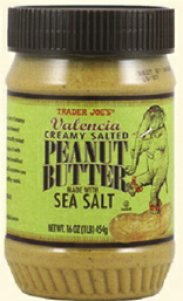Updated September 25, 2012
There are now 30 confirmed cases of Salmonella poisoning linked to Trader Joe’s peanut butter in 19 states, and 4 of them were hospitalized, including one person in the Twin Cities area of Minnesota. Attorney Fred Pritzker, who represents Salmonella victims nationwide, has been contacted by potential victims of this outbreak. “Sunland, Inc., the manufacturer of the Trader Joe’s peanut butter associated with this outbreak, has recalled many of its products containing peanuts and almonds. I expect this outbreak to grow and more states to be involved,” said Pritzker.
 The Centers for Disease Control and Prevention (CDC) and state health departments have determined that Trader Joe’s Valencia Peanut Butter with Sea Salt is one source of the outbreak of Salmonella Bredeney infections . The case count is now as follows: Arizona (1), California (2), Connecticut (3), Illinois (1), Louisiana (1), Massachusetts (3), Maryland (1), Michigan (1), Minnesota (1), Missouri (1), Nevada (1), New Jersey (2), New York (1), North Carolina (1), Pennsylvania (2), Rhode Island (1), Texas (4), Virginia (1), and Washington (2).
The Centers for Disease Control and Prevention (CDC) and state health departments have determined that Trader Joe’s Valencia Peanut Butter with Sea Salt is one source of the outbreak of Salmonella Bredeney infections . The case count is now as follows: Arizona (1), California (2), Connecticut (3), Illinois (1), Louisiana (1), Massachusetts (3), Maryland (1), Michigan (1), Minnesota (1), Missouri (1), Nevada (1), New Jersey (2), New York (1), North Carolina (1), Pennsylvania (2), Rhode Island (1), Texas (4), Virginia (1), and Washington (2).
Salmonella Bredeney is a rare strain of the bacteria. PulseNet usually only records 5 to 8 cases in an entire year, so this cluster does indicate an outbreak. Of the fourteen people the CDC has interviewed, all shopped at Trader Joe’s locations across the country before becoming sick. And twelve, or 86%, of the interviewed patients ate Trader Joe’s Valencia Creamy Salted Peanut Butter made with Sea Salt the week before becoming ill.
Since 76% of ill persons are under the age of 18, it’s very important that parents remove this product from their homes. The product was sold in Trader Joe’s stores and online. Children, along with the elderly and those with compromised immune systems, are most likely to become seriously ill with a Salmonella infection.
Symptoms of Salmonella food poisoning include diarrhea, fever, and abdominal cramps. These symptoms usually begin 12 to 72 hours after exposure. While most people recover without treatment, some become dehydrated or develop salmonellosis, when the bacteria enter the bloodstream. Antibiotics are necessary to treat the infection when it reaches this stage. And the long term consequences of Salmonella food poisoning can be serious, including Reiter’s syndrome, or reactive arthritis, and heart disease.




